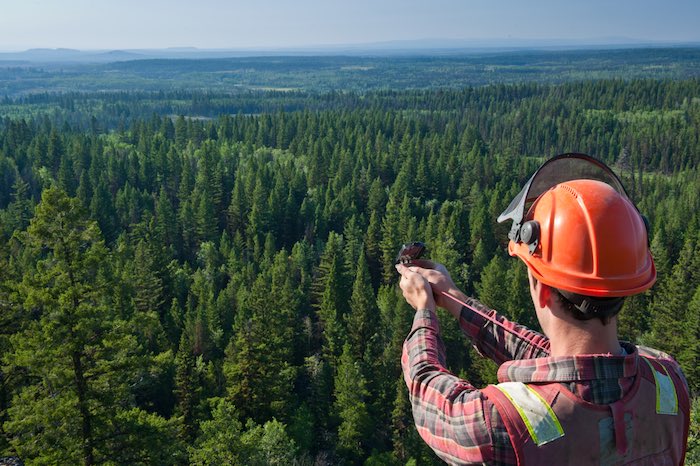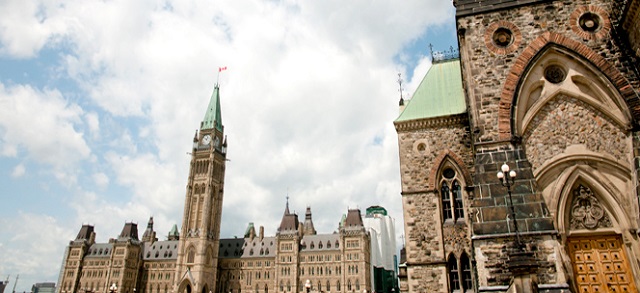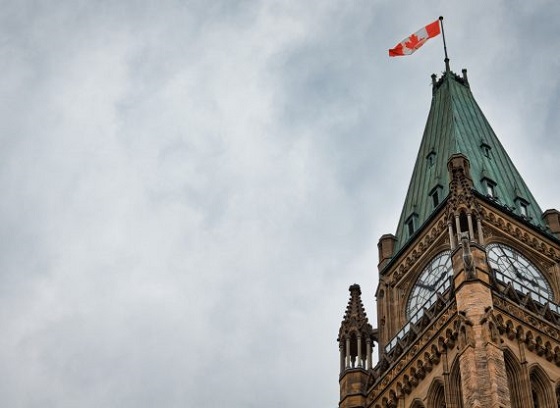Business
Canada’s Forest Sector Responds to Misleading Report

The legacy media is widely distributing an article outlining a report released by the Natural Resources Defense Council claiming Canada’s forestry sector emits even more carbon than Alberta’s oilsands. Not wishing to undergo the same vilification as the oil sector, the Forest Products Association of Canada is quickly countering the report with this article.
Article Submitted by the Forest Products Association of Canada
Earlier today, the Natural Resources Defense Council (NRDC) and Nature Canada jointly released a misleading and damaging report on Canada’s GHG emissions. Derek Nighbor, President and CEO, Forest Products Association of Canada (FPAC) issued the following statement in response:
Last week, economists from the Royal Bank of Canada confirmed their expectation that Canada will enter a recession in the first quarter of 2023. This presents unique challenges for working families in rural and northern Canada where economic prospects are often limited to a few key industries like agriculture, energy, mining, and forestry.
In hundreds of these communities across the country – from Prince George, BC to Corner Brook, NL – the forest sector is a central economic driver and provides jobs to over 200,000 Canadians. Beyond its economic contributions, Canadian forestry is known globally for its responsible harvest practices, high quality products, and its ability to help build a lower carbon economy. Canadian foresters also play an essential role in mitigating growing fire risks, protecting carbon rich wetlands, building with renewable, carbon-storing wood products, and creating environmentally friendly products from what would otherwise be wood waste.
Nordic countries show us how boreal forests can be managed to maximize carbon storage, even in a warming climate. Although their forests are much smaller, Finland and Sweden harvest six to eight times the timber volume per forested hectare than Canada does. At the same time, the net annual increase in stored carbon in Sweden’s forest is so large it reduces national GHG emissions by 70%. These Nordic governments have done something that Canada has not. In developing their climate plans, these leaders have worked with key industries like forestry to build sector-specific plans to maximize environmental and economic outcomes.
While we were disappointed to see another misleading report on forestry issued by the US-based Natural Resources Defense Council (NRDC) and Nature Canada, we were not surprised. Both NRDC and Nature Canada fundraise on their anti-Canadian forestry campaign rhetoric.
It’s worth noting that staff in NRDC’s New York, Washington, and San Francisco offices suggest they care about Canada’s forests and Canadian workers, even as they actively lobby multiple US states to encourage state legislators to restrict Canadian forest products coming into those states. For reasons that are difficult to understand, Nature Canada has chosen to be a willing partner.
Let’s be clear. Canada has a forest carbon problem that is caused by the worsening natural disturbance patterns we are seeing through drought, pest outbreaks, and catastrophic wildland fire. It’s a growing problem impacting forest health and resiliency, human health and community safety, and we urgently need constructive solutions – not deliberately misleading attacks.
FPAC continues to call on the federal government to follow the Nordic examples and work with our sector to develop a comprehensive plan for Canadian forestry, even as we contribute to the federal National Adaptation Strategy (NAS), which is a key deliverable and discussion matter at the upcoming COP 27 global climate conference next month in Sharm El Sheikh, Egypt.
Canadian forestry needs an NAS that minimizes climate-driven disturbance by actively reducing disturbance risk and supporting forest operations that maximize long-term carbon storage performance. This means increased timber harvests that value carbon and forest health – and the creation of new markets for low-grade wood fibre, including via thinning and residual biomass. It also means more forestry – not less. Forestry that will accelerate economic reconciliation with Indigenous communities, keep communities safer from fire risks, support biodiversity conservation and important ecosystem values, and provide good-paying jobs and careers in the rural and northern Canadian communities that desperately need them.
Business
Budget 2025 continues to balloon spending and debt

The Canadian Taxpayers Federation is criticizing Prime Minister Mark Carney for ballooning spending and debt in Budget 2025.
“Budget 2025 shows the debt continues to spiral out of control because spending continues to spiral out of control,” said Franco Terrazzano, CTF Federal Director. “Carney needs to reverse course to get debt and spending under control because every dollar Canadians pay in federal sales tax is already going to pay interest charges on the debt.
“Carney isn’t close to balancing anything when he’s borrowing tens of billions of dollars every year.”
The federal deficit will increase significantly this year to $78.3 billion. There is no plan to balance the budget and stop borrowing money. The federal debt will reach $1.35 trillion by the end of this year.
Debt interest charges will cost taxpayers $55.6 billion this year, which is more than the federal government will send to the provinces in health transfers ($54.7 billion) or collect through the GST ($54.4 billion).
Budget 2025 increases spending by $38 billion this year to $581 billion. Despite promises to control spending in future years, Budget 2025 projects that overall spending will continue to rise by billions every year.
“Canadians don’t need another plan to create a plan to meet about cutting spending, Canadians need real spending cuts now,” Terrazzano said. “The government always tells Canadians that it will go on a diet Monday, but Monday never comes.
“And the government isn’t really finding savings if it’s planning to keep increasing spending every year.”
Budget 2025 commits to “strengthening” the industrial carbon tax and “setting a multi-decade industrial carbon price trajectory that targets net zero by 2050.”
“Carney’s hidden carbon tax will make it harder for Canadian businesses to compete and will push Canadian entrepreneurs to set up shop south of the border,” Terrazzano said. “Carney should scrap all carbon taxes, cut spending and stop taking so much money from taxpayers.”
Business
Federal budget: Carney government posts largest deficit in Canadian history outside pandemic

-
Federal deficit projected to exceed $78 billion
-
This is Ottawa’s tenth consecutive unbalanced budget
-
Every newborn baby in Canada now enters the world with a debt of more than $33,000.
Repackaging record spending as “investments” while offering no credible path back to balance is the opposite of responsible fiscal stewardship, asserts the MEI in response to the tabling of the federal budget this afternoon.
“Canadians should find a deficit this large extremely troubling,” says Emmanuelle B. Faubert, economist at the MEI. “The attempt to disguise it under a new wave of so-called investments makes it even more concerning.
“It’s one thing to spend money you don’t have; it’s yet another to shirk responsibility for it.”
The Carney government is projecting a deficit of $78.3 billion for 2025-2026, up from $48.3 billion last year.
Interest payments are projected to rise to $55.6 billion this upcoming fiscal year, but servicing the debt will mount rapidly: to $76.1 billion by 2030, a 37 per cent spike.
Current debt charges cost taxpayers more than federal healthcare transfers to provinces, which amount to $54 billion annually.
This budget deficit would bring the national debt to $1.48 trillion, and mark the tenth consecutive year without a balanced federal budget. Every newborn baby in Canada now enters the world with a debt of more than $33,000.
Much of the new spending is categorized as capital as opposed to operational, which is a new reclassification scheme unveiled by the Carney government that does nothing to change the total debt. The government’s net debt is predicted to grow by another 21 per cent by 2030, to $1.79 trillion.
The Build Canada Homes program, for one, has an initial $13-billion price tag. The MEI studied a similar program launched in New Zealand, which accomplished just 3 per cent of its total objective.
The MEI warns that this marks a shift toward increased central planning, with Canada becoming an economy where politicians, instead of businesses and consumers, decide which industries succeed.
Overtures in the budget hint at a possible future walk-back of the emissions cap, which the think tank has strongly advocated for. In March, the PBO released a report estimating that the emissions cap would reduce our collective prosperity by $20.5 billion in 2032 and result in 40,300 fewer jobs than there would otherwise be.
A clearer path toward shrinking the federal bureaucracy has been laid out, with the government planning to eliminate 16,000 full-time positions, representing 4.5 per cent of the workforce as of March 2025.
Economist Emmanuelle B. Faubert would like the government to go further. While Ottawa plans to maintain the size of the federal bureaucracy at about 330,000 employees by 2028-29 through attrition, the MEI sees this as insufficient, and urged a more ambitious approach in its pre-budget submission.
The MEI recommended cutting the federal workforce by 17.4 per cent, mirroring the Chrétien-era reductions of the 1990s, which would eliminate roughly 64,000 positions and save taxpayers $10 billion annually.
The MEI welcomes the decision to expand capital cost allowances, letting businesses write off new machinery and equipment more quickly. This measure promotes investment and productivity by reducing the upfront cost of doing business.
“The government may try to rebrand its debt, but Canadians will still be the ones paying it off for decades,” says Ms. Faubert. “Carney calls it a generational budget, and he’s right, but only because future generations will be stuck footing the bill.”
* * *
The MEI is an independent public policy think tank with offices in Montreal, Ottawa, and Calgary. Through its publications, media appearances, and advisory services to policymakers, the MEI stimulates public policy debate and reforms based on sound economics and entrepreneurship.
-

 Crime2 days ago
Crime2 days agoPublic Execution of Anti-Cartel Mayor in Michoacán Prompts U.S. Offer to Intervene Against Cartels
-

 International2 days ago
International2 days agoNigeria better stop killing Christians — or America’s coming “guns-a-blazing”
-

 Daily Caller20 hours ago
Daily Caller20 hours agoTrump Reportedly Planning Ground Troops, Drone Strikes On Cartels In Mexico
-

 Alberta13 hours ago
Alberta13 hours agoAlberta government’s plan will improve access to MRIs and CT scans
-

 Alberta1 day ago
Alberta1 day agoCanada’s heavy oil finds new fans as global demand rises
-

 Addictions1 day ago
Addictions1 day agoThe War on Commonsense Nicotine Regulation
-

 Health1 day ago
Health1 day agoRFK Jr’s argument for studying efficacy of various vaccines
-

 Aristotle Foundation2 days ago
Aristotle Foundation2 days agoB.C. government laid groundwork for turning private property into Aboriginal land











